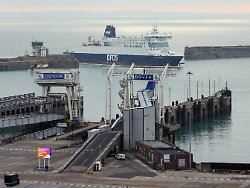Sunday 10th January 2021
Bad Brexit awakening
British associations are calling for talks with the EU
With the exit from the internal market and the customs union, British companies are feeling the concrete consequences of Brexit for the first time. The government's full-bodied promise of a "fantastic" trade pact does not stand up to the reality check. London should renegotiate.
Around one and a half weeks after the UK finally left the customs union and the EU's internal market, calls for renegotiations with Brussels on the trade pact are loud. In particular, regulations on customs duties and food safety as well as VAT in cross-border trade cause difficulties.
In some cases, companies simply stopped trading between Great Britain and the EU out of uncertainty about the regulations or because of the additional effort – including exporters of fish, a parcel service provider and fashion chains. Northern Ireland is particularly badly affected. There were complaints there about empty supermarket shelves.
The province is part of the United Kingdom, but according to the exit agreement it is treated according to the rules of the EU customs union and the internal market. This is to prevent a hard border with the EU member Republic of Ireland and a resurgence of the Northern Ireland conflict.
British business associations are now hoping for further negotiations between Brussels and London to deal with the difficulties. "Where there are problems, there will have to be further talks," said the head of the British food trade association, the Food and Drink Federation, to the Observer. The executive director of the industry association Make UK told the newspaper that even customs experts with 30 years of experience were "amazed" at what the new regulations meant. In the worst case, he sees negotiations pending for years.
Customs and bureaucracy "baffle" the British
London and Brussels had only agreed on a free trade agreement on Christmas Eve, which came into force on New Years. Prime Minister Boris Johnson raved about a "fantastic" deal that would not involve any trade barriers. However, only goods that are manufactured or refined in Great Britain are exempt from customs duties. Many products such as clothes from British fashion chains that are sewn in Asia are not included. Not even food that has been produced in the EU and packaged in the UK. In addition, complex customs declarations and, in some cases, certificates of product safety are required for all goods.
The British Minister of State Michael Gove has therefore already warned of "considerable additional obstacles" in the movement of goods between Great Britain and the EU in the coming weeks. This will primarily affect the port of Dover, where thousands of trucks are transported by ferries to Calais in France and vice versa every day, said Gove. So far, the volume of traffic in the new year on the country's most important trade route has been significantly lower than usual.
The port of Dover announced that traffic across the English Channel is currently running smoothly. The volume in January is always lower than usual. But many companies are simply holding back their trucks because the necessary papers are not available. In addition, European logistics companies are hesitant to send their trucks to the island after long traffic jams shortly before Christmas when France completely closed its borders because of a new virus variant in England.
.
